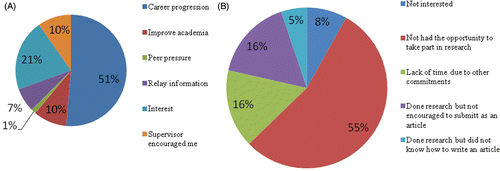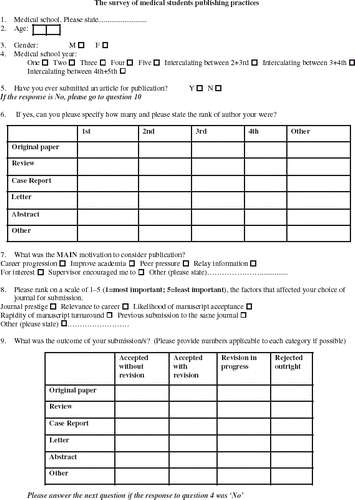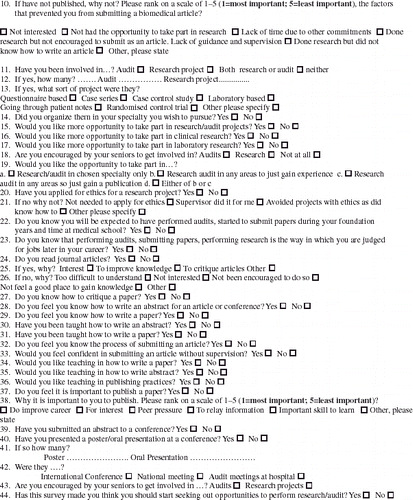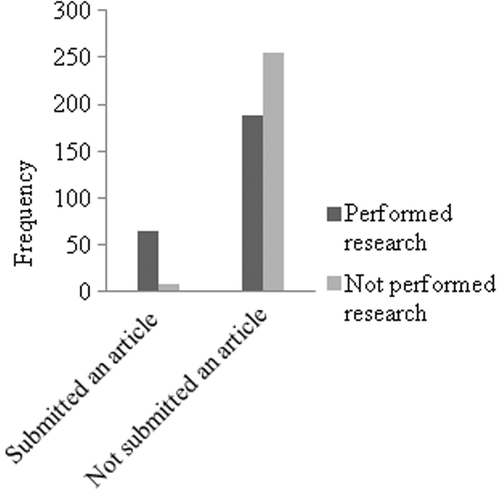Abstract
Introduction: With research playing a vital role in improving clinical practice, it is important that medical students understand the role of research and submitting articles for publication. Therefore, the aim of this study was to ascertain the experience, motivation and attitude of publishing of medical students.
Methods: A cross-sectional survey of British medical students from seven medical schools in the United Kingdom.
Results: Seventy-two of 515 had submitted an article for publication with a total of 124 articles being submitted. The main motivation to publish was for career progression. For the students that had not published, not having an opportunity to perform research was felt to be the main barrier. Only 49% of students had taken part in a research or audit project. Sixty-two percent of students stated they were not encouraged by the seniors to participate in research projects. From 515 medical students, only 88 students had submitted an article for a scientific meeting.
Conclusions: Students have a positive attitude towards publishing and they feel it is important. However, it is clear that students require and would welcome education in writing papers and abstracts, skills that they will need in their postgraduate careers.
Introduction
Research is important to improve health care (Global Forum for Health Research Citation2004). Medical students can play a role in the research productivity at an institution (Aslam et al. Citation2005). It has been shown that performing research allows medical students to gain critical thinking skills, ability to evaluate literature, provides lessons in teamwork, gain experience in writing and practice in communicating data with the scientific field (Frishman Citation2001; Houlden et al. Citation2004). Furthermore, performing undergraduate research, whether organised or extracurricular, has shown to support the student's attitude to research later in their career and possibility of career in academic medicine (Segal et al. Citation1990; Brancati et al. Citation1992; Reinders et al. Citation2005). This, coupled with the fact that the increasing competition for doctors for jobs has meant publishing (George & Moreira Citation2009), is now a form of assessment of career and personal development; it highlights the importance of assessing medical students publishing practices.
A few small studies have looked at the number of papers published by medical students, for instance, 17 publications from 201 students from the University of New Mexico School of Medicine (Rhyne Citation1997). A further study from the University of Calgary demonstrated a significant increase in medical student research manuscript submissions from 11% to 59% after a formal research programme was introduced. However, though few studies have looked at the rate of publishing by medical students, information regarding the motivation, experience and attitudes towards publishing remains limited.
Therefore, this study aimed to assess the publishing practices of British medical students to investigate potential barriers to performing research and submitting papers.
Methods
A 44-item questionnaire was distributed to medical students from year 1 to year 5 in seven medical schools in the United Kingdom using an on-line survey software (survey monkey). The questionnaire (Appendix 1) consisted of questions regarding their experience and motivation to publish articles whilst at medical school. The inclusion criterion was to include UK medical students across all years. Questionnaires that were not completed were excluded. Five hundred and fifteen completed surveys were returned. The results were put into Excel and then analysed using Stats Direct and Excel analysis tools.
Results
Demographics of the medical students
The medical students that participated in the survey were from either Manchester, Southampton, Cardiff, Peninsula, Warwick, University College London (UCL) or Edinburgh Medical School. The age, year and sex of the medical students varied and the medical students were represented from all years between first and fifth years including some postgraduate medical students ().
Table 1. Demographics of the medical students analysed
Publishing status of the medical students
Only 14% (72/515) of the medical students surveyed had submitted an article for publication while at medical school. The demographics of the students that had submitted articles are shown in . Most of the students that had submitted articles were in fifth year and doing an intercalated degree, accounting for 31% and 40% of the total number of students, respectively. There was a significant difference in the articles submitted by fifth years compared to first (Fisher's exact test, p = 0.0018), second (Fisher's exact test, p = 0.0160) and third years (Fisher's exact test, p = 0.0005) but not when compared to fourth year (Fisher's exact test, p = 0.4670) or students completing intercalated degrees (Fisher's exact test, p = 0.0522; ). Gender did not affect whether students submitted articles (Fisher's exact test, p = 0.8908). The medical school that students attended did affect their publishing practice (Chi-square test, p = 0.0002). When comparing the largest two medical schools that participated in the survey, there was a significant difference (Chi-square test, p = 0.001) between the number of students submitting articles at a problem-based learning medical school (Manchester) and a integrated style medical school (Cardiff). Of those students that had been published, there was a variety in the articles published with a total of 124 articles being submitted (). The main motivation to submit articles agreed by 51% of the students was for career progression with the majority submitting articles to journals that they felt had a high likelihood of manuscript acceptance (). The outcome of their submissions again was varied with only 32% accepted without revision (). For the 86% of students that had not published, 55% agreed that they had not published because they had not had the opportunity to take part in research ().
Figure 1. (A) Reasons why students submitted articles and (B) reasons why students had not submitted articles.

Table 2. Demographics of the students that had submitted articles for publication
Table 3. Type of articles submitted including the outcome of submissions
Research participation of the medical students
Including all of the respondents, only 49% had taken part in an audit or a research project. Those that were in fifth year had taken in the most of the projects showing a significant difference between fifth year and first, second, third and fourth years medical students (Fisher's exact test, p > 0.001; ). Most of the projects that the medical students had participated in involved going through patient's notes and questionnaire studies accounting for 59% of all projects. Of the students that had participated in research, 50% stated that they organised projects in the career they wish to pursue. A greater number of students who had published had performed research (64/72) compared to students that had not performed participation in research (8/72) (Fisher's exact test, p < 0.001; ). The medical school the student attended significantly affected whether or not they had published (Chi-square test, p < 0.001; ).
Teaching and opportunity to take part in research
Eighty-six percent agreed that they would like more opportunity to take part in research or audit. Ninety-one percent of students felt that they would like to take part more in clinical research and only 52% agreed they would like to take part more in laboratory research. Sixty-two percent felt they had not been encouraged by the seniors to take part in research. Fifty-seven percent of the students agreed that they would like to take part in research or publication to gain experience. Only 12% of students had applied for ethics for a research project. The main reason the medical students felt why they did not have this experience was that they did not have the opportunity to perform research.
Journal reading, presentations and posters
Seventy-eight percent of the students read journal articles, with 90% agreeing it was for either interest or to improve their knowledge. Of those students who do not read journal articles, they felt that they had not been encouraged to do so and felt journal articles were too difficult to understand. Evaluating the medical students’ experience at scientific meetings, only 17% had submitted an article for podium or poster presentations. The main reason the students had not had this experience was that they did not know they could submit articles. Of the medical students that had submitted abstracts, 66% were accepted for posters and 34% for podium presentations, giving of a total of 38 podium presentation and 77 poster presentations. These presentations ranged between international conferences (31%), national presentations (46%), regional conferences (14%) and audit meetings at their hospitals (9%).
Teaching received on writing papers
Only 49% felt they knew how to critique a paper. Regarding the experience in writing papers, only 52% agreed they knew how to write an abstract and 46% agreed they could write a paper. Analysing the students’ teaching experience, only 22% and 30% felt they had been taught how to write a paper and an abstract, respectively. Overall, 11% stated they knew the process of submitting an article for publication, with 92% agreeing that they could not submit a paper without supervision. Eight-six percent of the medical students felt it was important to publish papers and 90% felt they would like teaching in writing papers, 87% for abstracts and 91% regarding the publishing practices. When including both the students that submitted articles and had not submitted articles, the main reason students felt it was important to publish was to improve career progression.
Knowledge in the importance of publishing
Fifty-nine percent knew that medical students are expected to have performed audits and started to submit papers during their foundation years and time at medical school. Furthermore, only 59% knew that publishing and performing research is the way in which you are judged whilst at medical school. Whilst participating in the survey, 81% agreed that due to the survey they would seek out opportunities to perform research and audits.
Discussion
It is clear from this study that only a minority of medical students are submitting articles for publication which agrees with other studies that quote 8–17.6% of medical students either had anticipated or published articles (Arriola-Quiroz et al. Citation2010; Rhyne Citation1995). Of the students that had submitted an article, 70% were either in fifth year or doing an intercalated degree. Some articles have stated higher values, for example, one German study illustrated that 28% had publications with 7.8% first authorships (Cursiefen & Altunbas Citation1998) and 41% of 991 American medical students had published an article after performing a research project (Dyrbye et al. Citation2008). The differences may be accounted for by different students medical school curriculum, which was evident in this study when comparing a integrated taught medical school at Cardiff and a problem-based learning course at Manchester.
Interestingly, the main motivation for those who had published was for career progression, which demonstrates that the students are taking into consideration postgraduate challenges whilst at medical school. However, it is clear that not all of the students knew that publishing is imperative for their careers as only 60% knew this is how they would be judged for job applications and that they would have been expected to submit articles during their foundation and medical school years. With the British National Foundation training programme awarding points for publications (The Foundation Programme Citation2010) and publication status being used to assess for specialist training posts, it is important that this knowledge is clear to all medical students early on in their medical education (Medical Specialty Training England Citation2010).
For those that had not published, it is clear that the main barrier was not having the opportunity to perform research; hence, they felt they have nothing to declare as a publication. A survey of Australian medical researchers showed that research infrastructure support is vital to research productivity (Shewan et al. Citation2002) and another study showed that after organised research projects medical students can gain publications and presentations at conference (Zorzi et al. Citation2005). Obligatory involvement in research has been demonstrated to improve students attitude towards research as well as their knowledge (Segal et al. Citation1990). Other studies have found lack of time, neglect of normal studies and concern that student papers are rarely cited to be the barriers to medical student research participation (Diez et al. Citation2000; Aslam et al. Citation2005). In many developing countries, initiatives are being carried out to encourage research among undergraduates, which have shown to be successful (Aslam & Waheed Citation2005; Zier & Stagnaro Green 2001); therefore, improvements in British undergraduate research should be promoted.
Encouragingly, 78% read journal articles which is considerably higher than a study of doctors in Faisalabad where only 20% read journals monthly and 38% of postgraduates read journal articles only once in 6 months (Aslam et al. Citation2004). Reading journal articles is important as medical journals have a key role in the practice of evidence-based medicine (Sackett & Rosenberg Citation1995; Bordley et al. Citation1997). Only 49% knew how to critique an article. The ability to critique is important as doctors are expected to read the literature when faced with clinical problems, therefore being able to evaluate an article rather than taking it at face value if of utmost importance (Guyatt et al. Citation1994; Jaeschke et al. Citation1994). Hence, it is clear that teaching on the ability to critique articles needs to be introduced into undergraduate medical curriculum.
Only 50% of the students had been involved in research whilst at medical school despite numerous studies highlighting that medical school experience is strongly associated with postgraduate research participation (Aslam et al. Citation2005). In one Indian study, 91% of the newly qualified doctors reported no population-based research experience in medical school (Chaturvedi & Aggarwal Citation2001).
Sixty-two percent agreed that they were not encouraged by their seniors to get involved in research or audit projects. Positive role models and adequate mentorship are imperative to student research and, if unsupported, students can discontinue their work (Aslam et al. Citation2005).
The medical students agreed that publishing is important. This positive attitude towards research was also demonstrated in a study where 97% of students considered research as a useful alterative to elective (Frishman et al. Citation2001) and an average positive attitude score was found towards science and science research in a group of year 2 Croatian medical students (Hren et al. Citation2004). Furthermore, 70% and 78% agreed they had not received teaching on writing abstracts and papers, respectively, despite welcoming such teaching. Few studies have demonstrated that teaching on writing papers can increase publication productivity (Jackson Citation2009; Temple-Smith et al. Citation2009). Furthermore, courses teaching research methodology have shown to be effective in motivating medical students to solve scientific problems and embark on an academic career (Fang Citation2003) and a study concerning Pakistan medical students demonstrated that teaching could improve the knowledge about health research (Khan & Khawaja Citation1993).
Regarding the students’ participation in poster and podium presentations, only 17% had submitted an article for scientific meetings and with 42% stating they did know they could submit articles, it is evident that awareness of scientific meetings needs to be made clear to medical students. Scientific meetings are important places to learn the skills of being able to communicate your knowledge to the wider community and therefore would be beneficial to a medical student to experience (Ridde & Mohindra Citation2009).
There are strengths to this study which make the reported analysis reliable including the large population, using several institutions, looking at medical students from all years and trying to understand potential barriers to publishing practices. Furthermore, we have identified a questionnaire that can be successfully implemented to medical schools to monitor the publication practices of medical students in the future. A summary of the statistical comparisons made from the questionnaire is given in . One improvement to the study would be to assess how factors such as funding, student debt and opportunity to do intercalated degrees or higher degrees influence publishing practices of medical students.
Table 4. Summary of the statistical comparison made
Conclusions
In conclusion, this study highlights clearly that only a small percentage of British medical students are submitting papers for publication and presenting at conferences despite students viewing publication status being important for career progression. This can be improved by providing more accessible opportunities to take part in research or audit and encouragement and guidance from their mentors. Knowledge of how to write papers and abstracts as well as the publication practices is low among medical students though such skills are used as postgraduate criteria when being selected for jobs. Our findings show that teaching in writing papers would be welcomed by medical students. Education and awareness of how to successfully write scientific articles and abstracts should be made available for students at medical school as this will give them a strong foundation to embark on their postgraduate medical career where they will be expected to have these skills.
Acknowledgements
Funding and competing interests are not found in this study. Data sets are available from Griffin.
Declaration of interest: The authors report no conflicts of interest. The authors alone are responsible for the content and writing of this article.
References
- Arriola-Quiroz I, Curioso WH, Cruz-Encarnacion M, Gayoso O. 2010. Characteristics and publication patterns of theses from a Peruvian medical school. Health Info Libr J 27:148–154.
- Aslam F, Quayyum MA, Mahmud H, Qasim R, Haque IU. Attitudes and practices of postgraduate medical trainees towards research – A snapshot from Faisalabad. J Pak Med Assoc 2004; 54: 534–536
- Aslam F, Shakir M, Ahad Qayyum M. Why medical students are crucial to the future of Research in South Asia. PLoS Med 2005; 2: 1110–1111
- Aslam F, Waheed A. An audit of the students’ corner of Journal of Pakistan Medical Association. J Pak Med Assoc 2005; 55: 517–519
- Bordley DR, Fagan M, Theige D. Evidence-based medicine: A powerful educational tool for clerkship education. Am J Med 1997; 102: 427–432
- Brancati FL, Mead LA, Levine DM, Martin D, Margolis S, Klag MJ. Early predictors of career achievement in academic medicine. JAMA 1992; 267: 1372–1376
- Chaturvedi S, Aggarwal OP. Training interns in population-based research: Learners feedback from 13 consecutive batches from a medical school in India. Med Educ 2001; 35: 585–589
- Cursiefen C, Altunbas. 1998. A contribution of medical research to the Medline indexed publications of a German medical faculty. Med Educ 32:439–440.
- Diez C, Arkenau C, Meyer-Wentrup F. The German medical dissertation – Time to change?. Acad Med 2000; 75: 861–863
- Dyrbye LN, Davidson LW, Cook DA. Publications and presentations resulting from required research by students at Mayo Medical school 1976–2003. Acad Med 2008; 83: 604–610
- Fang D, Meyer ER. Effect of two Howard Hughes Medical Institute Research training programs for medicals students on the likelihood of pursing research careers. Acad Med 2003; 78: 1271–1280
- Frishman WH. Student research projects and theses: Should they be a requirement for medical school graduation. Heart Dis 2001; 3: 140–144
- George S, Moreira K. Publishing non-research papers as a trainee: A recipe for beginners. Singapore Med J 2009; 50: 756–758
- Global Forum for Health Research (2004) 10/90 Report on health research 2003-2004. Geneva: Global forum for Health research. [Accessed 2010 April 8]. Available from http://www.globalforumhealth.org/Media-Publications/Publications/10-90-Report-2003-2004
- Guyatt GH, Sackett DL, Cook DJ. Users’ guides to the medical literature. II. How to use an article about therapy or prevention. B. What were the results and will they help me in caring for my patients? Evidence-Based Medicine Working Group. JAMA 1994; 271: 59–63
- Houlden RL, Raja JB, Collier CP, Clark AF, Wuagh JM. Medical students’ perceptions of an undergraduate research elective. Med Teach 2004; 26: 659–661
- Hren D, Kresimir Lukic I, Marusic A, Vodopivec I, Vujaklija A, Hrabak M, Marusic M. Teaching research methodology in medical schools: Students’ attitudes towards and knowledge about science. Med Educ 2004; 38: 81–86
- Jackson D. Mentored residential writing retreats: A leadership strategy to develop skills and generate outcomes in writing for publication. Nurse Educ Today 2009; 29: 9–15
- Jaeschke R, Guyatt GH, Sackett DL. Users’ guides to the medical literature. III. How to use an article about a diagnostic test. B. What are the results and will they help me in caring for my patients? Evidence-Based Medicine Working Group. JAMA 1994; 271: 703–707
- Khan H, Khawaja MR. Impact of a workshop in the knowledge and attitudes of medical students regarding health research. J Coll Physicians Surg Pak 2007; 17: 59–60
- Medical Specialty Training England. 2010. Sample National Application Form for Specialty Recruitment 2010. [Accessed 2010 April 8]. Available from: http://www.mmc.nhs.uk/pdf/National%20Application%20form%20part2_FINAL%20v1_3.pdf
- Reinders JJ, Kropmans TJ, Cohen-Schotanus J. Extracurricular research experience of medical students and their scientific output after graduation. Med Educ 2005; 39: 237
- Rhyne RL. A scholarly research requirement for medical students. The ultimate problem based learning experience. Acad Med 1995; 70: 848–852
- Ridde V, Mohindra KS. The value of presenting at scientific conferences: Reflections by a couple of early career researchers. J Epidemiol Community Health 2009; 63: 3
- Rosenberg WM, Sackett DL. 1996. On the need for evidence-based medicine. Therapie 51:212–217.
- Segal S, Lloyd T, Houts PS, Stillman PL, Jungas RL, Greer RB, 3rd. The association between students’ research involvement in medical school and their postgraduate medical activities. Acad Med 1990; 65: 530–533
- Shewan LG, Glatz JA, Bennert C, Coats AJ. Contemporary (post wills) survey of the views of Australian medical researchers: Importance of funding, infrastructure and motivators for a research career. Med J Aust 2002; 177: 74–77
- Temple-Smith M, Goodyear-Smith F, Gunn J. Publish or perish evaluation of a writing week. Aust Fam Physician 2009; 38: 257–260
- The Foundation Programme. 2010. Foundation Programme 2010 Application Form. [Accessed 2010 April 8]. Available from: http://www.foundationprogramme.nhs.uk/pages/home/key-documents#FP2010form
- Zier K, Stagnaro Green A. A multifaceted program to encourage medical students’ research. Acad Med 2001; 76: 743–747
- Zorzi A, Rourke J, Kennard M, Peterson M, Miller K. Combined research and clinical learning make Rural Summer Studentship Program a successful model. Rural Remote Health 2005; 5: 401
Appendix



